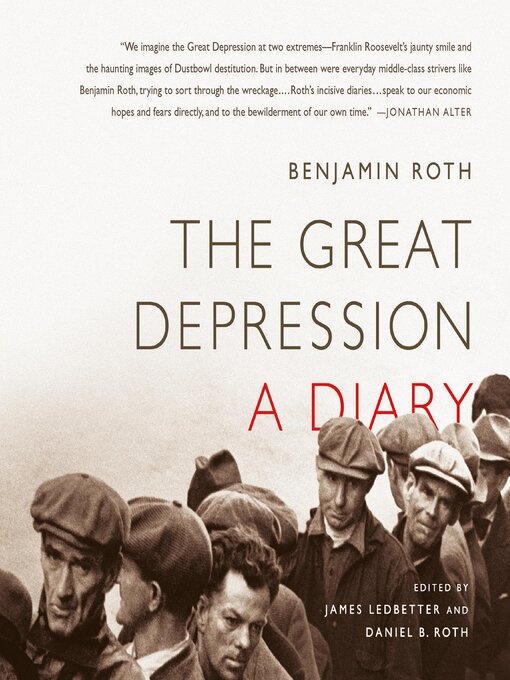In the early 1920s, Benjamin Roth was a young lawyer fresh out of the army. He settled in Youngstown, Ohio, a booming Midwestern industrial town. Times were good—until the stock market crash of 1929. After nearly two years of economic crisis, it was clear that the heady prosperity of the Roaring Twenties would not return quickly.
As Roth began to grasp the magnitude of what had happened to American economic life, he set out to record his impressions in a diary—a document that would grow to span several volumes over more than a decade. Penning brief, clear-eyed notes on the crisis which unfolded around him, Roth struggled to understand the complex forces governing political and economic life, yet he remained eager to learn from the crisis. As he wrote of what is now known as the Great Depression, "To the man past middle life it spells tragedy and disaster, but to those of us in the middle thirties it may be a great school of experience out of which some worth while lesson may be salvaged."
Roth's words from that unique time seem to speak directly to readers today. His perceptions and experiences have a chilling similarity to those of our own era. Fearful of inflation and skeptical of big government, Roth yearned for signs of true recovery, and eventually formed his own theories of how a prudent person might survive hard times. The Great Depression: A Diary, edited by James Ledbetter, editor of Slate's "The Big Money," and Roth's son, Daniel B. Roth, reveals another side of the Great Depression—one lived through by ordinary, middle-class folks, who on a daily basis grappled with a swiftly changing economy coupled with anxiety about the unknown future.
-
Creators
-
Publisher
-
Release date
January 28, 2025 -
Formats
-
OverDrive Listen audiobook
- ISBN: 9781668650868
- File size: 358020 KB
- Duration: 12:25:51
-
-
Languages
- English
-
Reviews
-
Library Journal
November 1, 2009
A Youngstown, OH, attorney during the Great Depression, Roth emerges as researcher and author in this diary, edited by his son Daniel Roth and James Ledbetter (editor, "The Big Money," Slate.com). Tracking both the social evolution in his town and the disruptions to the American economy during the 1930s and early 1940s, Roth wrote clearly, with an attorney's eye for detail about the drastic changes occurring; modern readers will see striking parallels between the economy then and now. Roth, an active Republican, clearly explained why he disagreed with New Deal policies and why he ultimately adjusted his reactions. Editors' notes add needed historical information to clarify Roth's explanations of market trends and events that might otherwise be fuzzy to today's average reader. Though the stock market quotes can become rather tedious, they are still helpful for comparing to trends historical and current. VERDICT This diary, while not rich in personal detail, is an excellent choice for those interested in the local and economic impact of the Great Depression.Sara Miller, Atlanta-Fulton P.L. Syst., GACopyright 2009 Library Journal, LLC Used with permission.
-
Formats
- OverDrive Listen audiobook
subjects
Languages
- English
Loading
Why is availability limited?
×Availability can change throughout the month based on the library's budget. You can still place a hold on the title, and your hold will be automatically filled as soon as the title is available again.
The Kindle Book format for this title is not supported on:
×Read-along ebook
×The OverDrive Read format of this ebook has professional narration that plays while you read in your browser. Learn more here.

